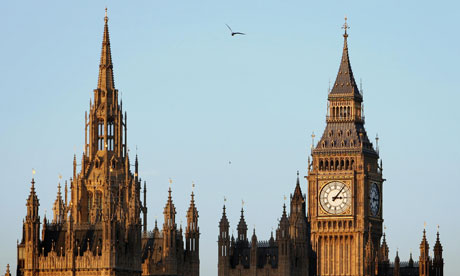Top tips for new MPs
This week 226 new MPs will pitch up at the Houses of Parliament, eyes blinking at its quaint procedures. But who to call 'honourable', who ranks as 'learned' – and, more importantly, where's the best coffee? Michael White offers some essential advice
-

- guardian.co.uk, Monday 10 May 2010 21.00 BST

The Houses of Parliament . . . the new MPs will have to get to grips with the customs. Photograph: Dominic Lipinski/PA
Your constituents will make ever-increasing demands, not all of them unreasonable, while reserving the right to despise you as a corrupt, time-serving parasite. Ministers (no, you are unlikely to be one) will quickly forget your name; civil servants may not bother to learn it. The whips will seek to bully you; the media, local as well as national, will monitor your every expense claim. It is the new blood sport.
So much for the good news. The bad news is more serious. No one is really sure any more what an MP is supposed to be or do. Years of over-mighty executive governments and debilitating Commons reforms meant that the Shamed Parliament of 2005-10 was already suffering an acute crisis of confidence long before the Daily Telegraph got hold of that bootlegged CD.
Many ex-MPs will believe to their dying day they were claiming allowances, not out-of-pocket expenses. After all, that is what they were told by successive governments – Thatcher to Brown – too cowardly to accept that politicians' pay had fallen far behind the inflated market rates for the people they mixed with all week: senior civil servants, lobbyists, management consultants, lawyers, bankers, hospital CEOs, town clerks, even hacks. As a member of the Virgin Parliament of 2010, you have been elected to fix all this. Good for you!
But first let's make you comfy by showing you around the Palace of Westminster. It is an exotic mixture of ancient and modern. Magnificent Westminster Hall, where royal bodies lie in state, was built in the 11th century. Over the road, Michael Hopkins's glass and steel annexe, Portcullis House, opened in 2001. In between is Barry and Pugin's neo-Gothic fantasy. Built after the old palace was largely destroyed by fire in 1834, it overran its construction budget for nearly half a century.
"Rebuild it on the river bank, so angry citizens can't surround the place," advised the canny Duke of Wellington. Nowadays, protesters can – and do – set up camp on Parliament Square to bellow angrily about Iraq through bullhorns. Useful tip: don't get an office where you can hear them.
In 1979, Airey Neave MP died when his car was blown up by Irish Republicans as he drove out of the underground car park. But MPs today are relatively safe on the parliamentary estate, the Gothic bit linked by an under-the-road tunnel to Portcullis and other outlying offices. The palace has been a target for self-righteous murderers since Guy Fawkes' day (1605), but nowadays it is much better protected: depressing concrete barriers, high fences, airport-style bag checks. You'll get used to the coppers with machine guns and the suffocating security. But your new pass with the green and white diagonal stripes will help you sail through once the staff get to know your face.
As you will have heard, there are quaint procedures, though reformers are trying to weed them out. Your cloakroom peg still sports a pink ribbon, not a symbol of support for breast cancer awareness, but on which to hang your sword. In the chamber you cannot step across two red-carpet stripes when speaking: they are two sword-lengths apart. You must still refer to colleagues as the "Honourable Member" ("my Honourable Friend" if he/she is on your side) unless they are "Honourable and Gallant" (military), or "Honourable and Learned" (barristers), fewer of either every year. There is a point to this third-party style of address. It is harder to call someone a liar, cheat, mountebank, fraud or bastard in the third person. Such words are banned anyway. Not that you will plan to get cross and behave like a Millwall fan at PMQs. It will just happen.
The Victorian chamber is out of fashion. TV allows MPs to watch it while working in their offices; no wonder it looks empty. But do not neglect it. "Go into the chamber, watch and listen, get the feel of the place and learn the ropes," advises one female veteran MP, who has just stepped down. The trick of asking questions that colleagues will not mock and your local paper will report is simple, so Glenda Jackson, MP and Oscar winner, tells new boys and girls: "Learn your lines. It's a performance." It is also part of holding ministers to account: an MP's key function.
You cannot expect to become a statesperson or even a lowly unpaid PPS in a week. "Leave that until year three," say some old lags. What a new MP must first do is secure his or her constituency base. "Your local reputation is formed in the first two years. If you do not secure it then you never will," a Labour heavyweight advises. That may mean slipping away on Thursdays to work the patch until teatime on Saturday. The whips encourage that, but it is bad for parliament.
Alas, it is not the only debilitating trend. Portcullis House, light, modern and airy, has drained its neighbouring Gothic building of much of its life and energy. So have "family friendly" hours, which see committees start at 9am and the House rise at 7pm two days a week. Where once the old palace's bars and corridors bustled with intrigue until midnight or beyond they are now deserted by eight.
On present trends you may live to see sagebrush blowing across the once-busy Members' Lobby, where looming statues of the great – from Disraeli to Thatcher – make you feel aware of history (and inadequacy). Few reporters hover here now to catch passing MPs; they phone, text or hover in Portcullis, increasingly the place to be. It has Wi-Fi and the best coffee. Young researchers sit there beneath the glass atrium roof and weeping figs, armed with their laptops. They eat in the disgustingly healthy Debate Cafe (no chips!) while MPs dine in the nearby Adjournment Bistro. It is so modern it could almost be Germany.
That could not be said of the wood-panelled Strangers' Bar (the Labour-packed "Kremlin" in Tory-speak), the Smoking Room (smoking no longer allowed), the Bishop's Bar in the Lords (where peers still keep late hours), the Members' and Strangers' Dining Rooms (non-MPs are all "strangers"), the posh Pugin Room or the Members' Tea Room. Annie's Bar, where MPs and hacks once met convivially is long gone.
Clem Attlee laconically advised new MPs to "specialise and stay out of the bars". Sure enough today's MPs are far more health conscious. The rifle range still exists (I have never found it) and the gym is now 30 years old. The place has also been feminised since Blair's Babes arrived in force. More womens' loos, a creche finally being established in the old Bellamy's Bar, an ironing board and shower in the Lady Members' Room.
MPs still have affairs with each other or – more usually – their secretaries. Yet the atmosphere is much more informal, less bloke-ish, more egalitarian: no longer golf-club-bar-meets-gentleman's club. The 2010 parliament has 139 women (21.4%) and 26 ethnic minority members (4.6%). Private education and the private sector are also on the up. In truth, parliament is more serious and frantic, less collegiate. MPs still play bridge, football, music or golf together. They form friendship groups and go off to curry houses in SW1 or nearby Kennington. Join them.
Unlike the bad old days, when you were left to sink or swim, you get hands-on mentoring and induction courses. Once, new MPs camped in a corridor, often for years, dictating letters to a shared secretary, paying for phone calls, renting a damp bedsit, sheltering in the library or the tea room. Those days have gone – though austerity is the 2010 watchword. You will get a decent office, but not a lovely one: they get trousered by old lags.
Cherish this moment. It is still a wonderful job, in which you can become a statesman, a diligent backbencher, a select committee chairman, a respected constituency champion or an idle parasite. First impressions do matter, so take your time.
http://www.guardian.co.uk/politics/2010/may/10/top-tips-new-mps
- guardian.co.uk © Guardian News and Media Limited 2010

No comments:
Post a Comment